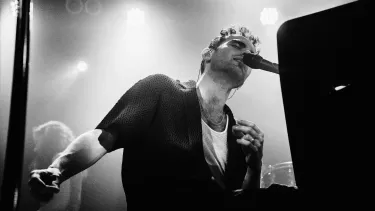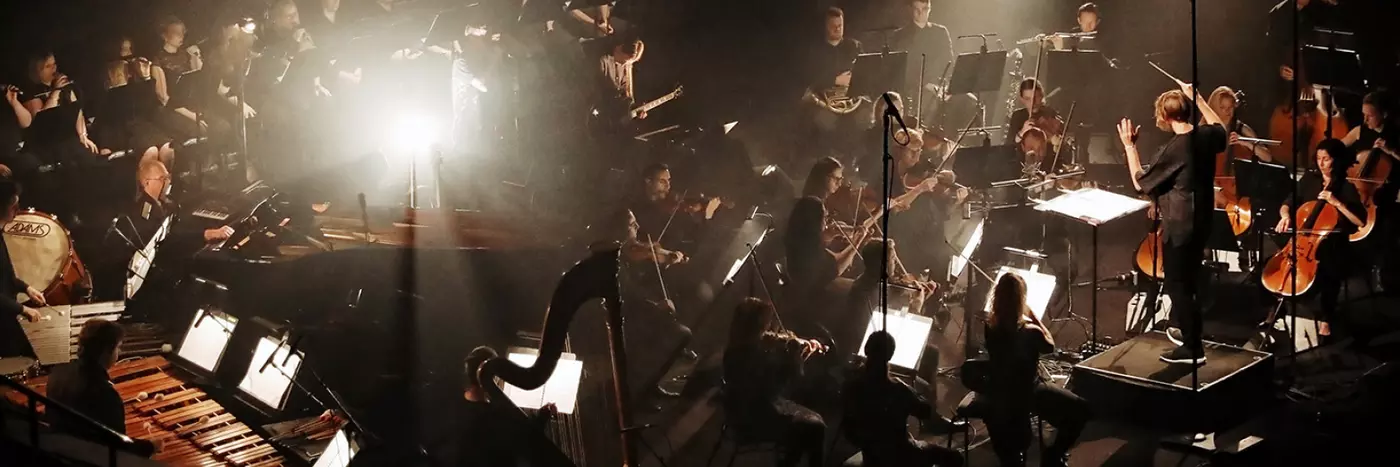Bathe in the ambient sounds of Jónsi and Alex Somers to soothe you during isolation
Watch the full never before released Riceboy Sleeps performance from Vivid LIVE 2019
Watch the Jónsi & Alex Somers: Riceboy Sleeps 10th Anniversary concert here.
In the age of self-help books, wellness and dare we say it, self-care, ambient music is now the popular background playlist designed for your headphones.
The surge in popularity for a longstanding genre is perhaps a reflection on society’s need for respite from digital culture and the fast-paced rat race while also seeking to connect with oneself. Or as Brian Eno, the genre’s creator says, “to induce calm and a space to think”.
Electronic mastermind Jon Hopkins mirrors this sentiment stating that people are "operating on a survival mode and ambient can really bring you out of that".
Now, in the time of COVID-19 and enduring isolation, your mental health requires even more love and attention. To help offer you sanctuary and solace, the Opera House alongside the Isolation Room (created by Sigur Rós co-manager John Best and sound designer David Sheppard) will release the immersive world premiere full performance of Jónsi & Alex Somers: Riceboy Sleeps 10th Anniversary with a special binaural audio mix. Designed for headphone listening, binaural recording technology creates a 3D soundscape similar to full surround sound for an immersive audio experience.
Never intended to be performed live, Riceboy Sleeps’ debut album was created together by long-time collaborators and partners, Jónsi of Sigur Rós and Alex Somers in their home studio. Performing the album in full for the first time at Vivid LIVE 2019 in celebration of its 10th anniversary, the album was brought to life with the Sydney International Orchestra and Choir and conducted by Robert Ames.
Maybe we just need it [ambient music], it’s a counterpoint to the crazy world.
Both artists have a profound love for ambient music, a genre that transcends the realms of typical music consumption. Their numerous collaborations have focused on the experimentation of sound for healing in music, including Sigur Ros’ ‘endless mixtape’ Liminal collaboration with Somers and Paul Corley, designed to mirror the journey of a sleep cycle.
The Liminal playlist was used in live ambient sound baths, an immersive audiovisual experience where audiences lie down on the floor and meditate to the evolving minimalist soundscapes at events such as David Lynch’s Festival of Disruption and locations in Los Angeles.
The fourth volume of Liminal was launched with relaxation and meditation app Calm, followed by a free ambient sound bath performance in London (the biggest sound bath to date) and a livestream to experience it from home, extending Alex Somers’ belief that “music heals… sound heals”.
The never-before-released Opera House performance of Jónsi & Alex Somers: Riceboy Sleeps is poignantly timed. Their transformative sounds and music will provide virtual audiences an opportunity to switch off and be present in the moment, sharing in this transcendent experience during quarantine, when we need it the most.
An interview with Alex Somers
Before Alex Somers took to the stage to perform the world premiere 10th Anniversary of Riceboy Sleeps, the ambient musician sat down with Josh Milch to talk about how Somers and Jónsi created the masterful record over a decade ago.
____
JM: First of all, congratulations on your performance at the Opera House, I know it uplifted a lot of souls in the Concert Hall. How did it feel to bring the album to life in its entirety for the first time in 10 years?
AS: We were just so so happy — to be honest we were really grateful. We couldn’t believe that we got to play the first ever performance of our album in that space. With all those beautiful, generous people. We felt the music translated pretty well and thought the audience was really nice, the players were great, we thought the conductor did a good job. You always want more rehearsal time, but we feel like we managed to do everything in time and I feel like there was a good feeling in the room.
Was it a conscious decision to hold off performing the album until now?
Absolutely. I mean the record is very understated — it kind of embraces smallness in a way that is just inherent to everything we do, and for that reason we never played it live. When it was brought to our attention that the record was going to have its 10th birthday, it felt nice to just do as a gesture towards it, to recognise it and fully realise it in a way we never had.
When I listen to 'Boy 1904', I feel like there are undertones of chromaticism and Renaissance choral music — did you ever take a conscious inspiration from those periods in making this record?
Actually not very much, but you’re right — 'Boy 1904' is the one choral piece that definitely draws from some of that era of vocal music, of Renaissance vocal music. But to be really honest, Jónsi and I aren’t super familiar with a lot of that kind of music. We have friends that are steeped in that world and when we come across it we’re like “What is this called?!” — and they’ll be like — “This is Renaissance” and we’ll be like “ooh!”. So I think some of that flavour somehow squeezed into that piece of music. But I would say outside of 'Boy 1904' I would go so far as to say there was zero classical music influence on that record, even though I studied music, Jónsi hasn’t — we don’t listen to much or know very much about it. I mean we have loved certain Gavin Bryars pieces to death, we love certain Arvo Pärt music, some certain John Tavner. So we do know some of it — but it’s not where we draw our influence from.
It was more punk to be honest. The DIY punk spirit of capturing small sounds, slowing them down to various speeds and then adding effects and then hearing these small details that were all around us. And then, building pieces of music on top of them, just instinctively. That was more how we were working, you know?
That’s such an interesting contrast — approaching an ambient piece of music with a punk sensibility and then handing it over to a classically-trained orchestra and choir. What’s it like to impart your music and have it realised by an ensemble of players like that?
It was a really cool process. So in order to do that we had two amazing collaborators that helped us fully realise the piece— Robert Ames who runs the London Contemporary Orchestra and David Handler in New York City who works closely with the Wordless Music Orchestra. When we made the record, we worked with a small string ensemble, and a small choir — everything else we played ourselves, so this was taking those ideas we did back then and kind of like translating and reorchestrating them so they would make more sense in an ensemble that was larger and they did a great job. They really got it. They added things that weren’t there that they imagined — and we were like “Oh we didn’t actually play that, but it’s cool.” It almost had the impact of the game 'telephone' [aka. chinese whispers]. It was neat because we knew that would happen, and then it did and we really liked it. And then there were times where we didn’t like it and we just told them. We worked on this on and off for a long time — about a year — so we had time. Pretty much all the non-linear ideas happened by accident or imagination.
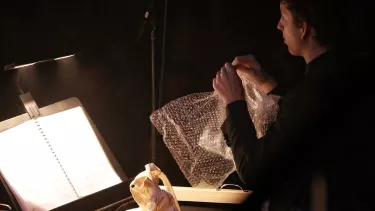
Obviously 10 years is a long time in anyone’s life — let alone in a musical career. How do you feel you’ve developed musically since the record — do you think you bring something different to the record than you would have 10 years ago?
Definitely. I feel like it’s a whole lifetime ago. The album sonically and technically is very imperfect. If was making now, it would sound so different because I’ve learned so much about engineering and mixing. I do think that being an amaetur, as I was back then, really freed me up creatively. I wasn’t concerned with things that didn’t register in my mind. So I honestly think it all happened the way it was meant to be. To be able to make a record that is kind of homemade and DIY and a little bit lo-fi was just part of my path and I’m glad I didn’t know what I know now then because then it would’ve been different.
I guess right after when this record came out I became obsessed with audio engineering and mixing and producing — so more studio kind of work. I got obsessed with sound. So that was the path I went down for a couple of years. I opened my own recording studio in Reykjavík, I invested in studio equipment and microphones. With the help of some friends and a lot of self-teaching, I learned how to record instruments, where to put the microphones, how to space them, how to layer them, how to mix it all together. So that’s where I put my energy.
So now, being someone who writes music and composes music and also is thinking a lot about sound and layering and mixing — it’s really informed my process in a way.
Did you and Jónsi have distinct roles in the compositional process?
For this album, this stuff was all written together. And neither one of us were really engineers back then so it was engineered kind of by both us, working with what we had. Jónsi knew a little bit more about engineering because he had been in a band for a long time and spent some time in recording studios.
If you think about the songs in basic harmony — left hand, right hand — bass, chord progression and upper register/melody. Every single song was co-written. One of us would do the chords and one of us would do the counterpoint like the high-harmony, and vice versa. I’m pretty sure there’s not anything that one of us just wrote. We did so much together — like I would write something and think it was on a good trajectory, and then Jónsi would put these beautiful chord movements under it that I’d never heard. So we really worked closely together in that respect.
The Australian magazine Limelight described your performance of Riceboy Sleeps in Tasmania as being like held by “aurally nurturing hands.” Why do you think ambient music resonates more strongly with people today than ever before?
I don’t know, I’ve been wondering that too. It’s like a joke in my friend circle because I’ve been listening to ambient music since I was fifteen or sixteen, when I discovered Aphex Twin’s Selected Ambient Works II. And then that led me to other things. It’s been such an important part of my life, I feel like it strips away everything else — it’s just pure melody. Maybe for some people it’s a little bit too slow and patient and just boring. But I love melody, I’ve always loved melody. So I love ambient music that doesn’t shy away from being highly melodic. Maybe we need that. It does seem like it’s having a moment, that more people than ever before care a little bit about ambient music or are patient enough to invest listening to ambient music and people are making it and it’s beautiful. Maybe we just need it, it’s a counterpoint to the crazy world, it’s a counterpoint to your outerworld and you create an inner world that’s changing at your own pace. What do you think?
I’ve started to think of it as a response to the intensity and saturation of digital culture — in some ways it offers a form of enforced respite, you have to look away from the information overload, but you do it sonically.
That’s cool, I like that. And this new wave of ambient stuff — it’s not cheesy. I think for a long time, people just thought of it as “New Age” synth pads going on for 18 minutes. I think people are a little bit less allergic to it now, because there’s alternative ambient stuff that can take all different kinds of forms. You can do ambient music that’s like really harsh or intense, or really soothing or beautiful. Orchestral or synthy or acoustic — there are so many different forms of it now which maybe wasn’t the case years ago.
Thanks for taking the time Alex, lovely to chat.
Thanks for being so supportive of our album and our show, it really meant a lot to be doing this at this time in our lives.
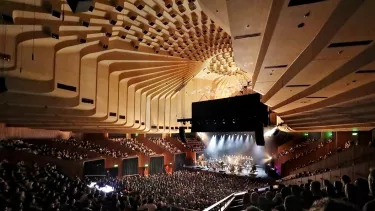
You may also like
Gillian Welch and David Rawlings
23 – 25 Jan 2025
Grammy Award-winning Nashville duo Gillian Welch and David Rawlings make their long-awaited return to Australia with two unforgettable nights in the Concert Hall.
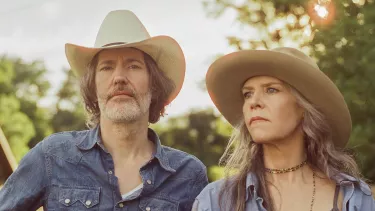
Max Richter
14 & 15 Feb 2025
Performing a groundbreaking new suite of music, post-minimalist master Max Richter returns to Australia for two shows with the American Contemporary Music Ensemble.
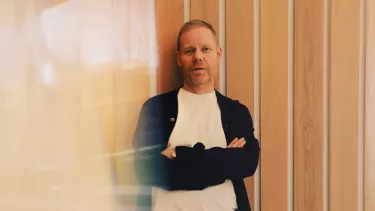
Jordan Rakei
26 Feb 2025
Touring his spectacular new record, Grammy-nominated soul and R&B singer, songwriter and multi-instrumentalist Jordan Rakei returns to make his Sydney Opera House debut.
